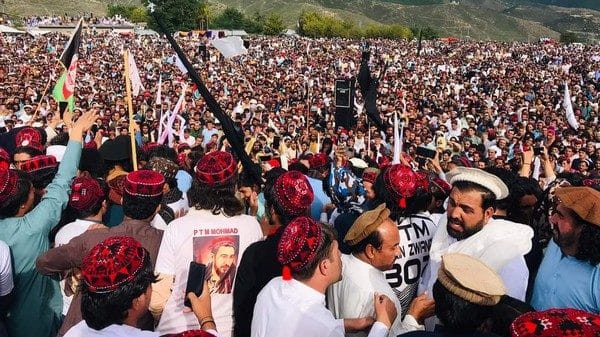As Pakistan’s mainstream political parties continue their relentless pursuit of power in Islamabad, engaging in political manoeuvring over constitutional amendments, a much darker reality unfolds on the peripheries of the country. Far from the echo chambers of Islamabad, in Balochistan and Khyber Pakhtunkhwa, the military’s unchecked power has been on full display, cracking down on peaceful dissent and, once again, turning its guns on the very citizens it claims to protect.
For four consecutive days, the military bombarded Baluch civilians, and in the same breath, banned the Pashtun Tahafuz Movement (PTM), a civic rights group advocating for Pashtun dignity and peace. The result — further erosion of the Pakistani State’s moral authority. These twin realities, the brutal crackdown on the PTM and the suppression in Balochistan, expose a troubling truth: Pakistan’s political and military elites, particularly from Punjab, are largely untouched by the strife that continues to consume the country’s periphery.
While the political elite play their games in Islamabad, the military is engaged in a campaign of terror in the regions they view as little more than pawns in their geopolitical and security objectives. The killing of prominent PTM activist Gilaman Wazir in the heart of Islamabad is a grim reminder of this reality. His assassination is widely believed to be orchestrated by State-backed elements. PTM leader Manzoor Pashteen vowed to continue the fight for Pashtun rights, announcing plans to convene a grand Pashtun jirga, inviting all Pashtun leadership to stand united in the face of systemic repression.
The PTM, whose motives center on ensuring peace, dignity, and rights for Pashtuns, has been systematically targeted by the Pakistani State over the past six years since its establishment in 2018 . The movement has lost many of its top leaders to assassinations carried out by ‘unknown gunmen’, who, the PTM claims, are backed by Pakistan’s shadowy intelligence agency, the Inter-Services Intelligence (ISI). Others, like PTM founder and former MNA Ali Wazir, remain behind bars.
The Pakistani State refuses to engage in dialogue with the PTM. Instead, it opts for an iron-fisted approach, cracking down on the movement’s peaceful gatherings and banning a civic and peaceful movement under terrorism laws.
The State hit a new low when authorities disrupted a grand assembly in Khyber district. Four protestors were killed and dozens were injured. PTM tents were torn down, and security forces went as far as to stop local shopkeepers from selling water, tents, suspending internet and telecommunication, and other basic supplies to those attending the jirga. In a brazen show of state power, the military even watered down the ground to prevent the gathering from continuing. The result? The continued suffocation of Pashtun civic space.
Also read: Pashtuns in KP are becoming less tolerant of Pakistan Army & state. It brings a heavy cost
The message is clear
It is becoming increasingly clear that Pakistan’s military and political leadership view Pashtuns as second-class citizens. By banning a peaceful civic movement, the State is sending a clear message: It has no interest in resolving the plight of the Pashtuns. Instead, the State seeks to maintain its old strategy of using the Pashtun regions as chess pieces in its geopolitical games, with little regard for the human cost.
The military’s actions reveal an inconvenient truth: It is not sincere about peace in the Pashtun regions. If it were, it would not be purging, killing, and detaining PTM workers. Instead, it would be working hand-in-hand with the PTM to address the legitimate grievances of the Pashtun people. The fact that the PTM’s peaceful advocacy for Pashtun rights is met with violence suggests that the State prefers to perpetuate instability rather than come up with conflict resolution.
But the military’s strategy is not just about silencing the PTM. Experts believe that it is also about dissuading other youth from joining the movement, hoping to fracture the Pashtun base of support for former Prime Minister Imran Khan and his party, Pakistan Tehreek-e-Insaf (PTI). By cracking down on PTM, the military seeks to divide Pashtuns, weaken PTI’s influence in Khyber Pakhtunkhwa, and reduce the party’s electoral foothold and popularity. This, the army hopes, will allow the ruling political coalition — led by the Pakistan Muslim League (Nawaz) and the Pakistan People’s Party (PPP) – to further consolidate power.
However, the PTI’s silence on the military’s actions against the PTM is deafening. While party leaders themselves claimed to be victims of federal government oppression, they remain conspicuously quiet on the military’s crackdown in Khyber Agency. By staying silent, PTI’s provincial government has effectively condoned the military’s actions, further alienating the very Pashtuns they claim to represent.
Question for Pakistani leadership
In the short term, the military may succeed in achieving tactical success. But in the long term, its continued repression of Pashtuns will have severe consequences. Pashtun youth, now more than ever, understand that they have no place in Pakistan’s political landscape. Their dignity is trampled upon, their rights denied, voices silenced. The fear that the military has instilled in the hearts of Pashtun youth is rapidly transforming into anger, resentment, and hatred – forces that could one day break the very fabric of Pakistan itself.
The question for Pakistan’s military and political leadership is this: Will they continue to view Pashtuns as expendable or finally recognise that the suppression of civic movements like the PTM is a path to national disintegration? The time to choose is now. The consequences of making the wrong choice will be devastating for the future of Pakistan.
Aziz Amin is a writer and analyst. He’s currently serving as a fellow at the Oxford Global Society Think Tank, Oxford U.K., and the Brenthurst Foundation. He tweets at @iamazizamin.
(Edited by Humra Laeeq)






